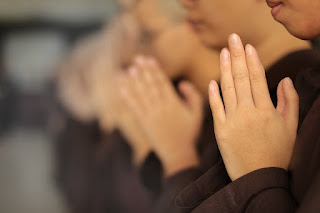Confession as Honesty
As with most mainline churches in America, in our worship gatherings at my little UCC church in Ramona, we almost always share in a prayer of confession. And it’s usually pretty early, if not right at the beginning of the worship liturgy. It’s most often a unison prayer that we read out loud together, a practice I have always found meaningful. Sometimes you just need the words and voices of others to carry you through a prayer, especially a prayer of confession.
The prayer may go something like this:
“Most merciful God, we confess that we have sinned against you in thought, word, and deed, by what we have done, and by what we have left undone. We have not loved you with our whole heart; we have not loved our neighbors as ourselves. We are truly sorry and we humbly repent. For the sake of your Son Jesus Christ, have mercy on us and forgive us; that we may delight in your will, and walk in your ways, to the glory of your Name. Amen." (The Book of Common Prayer, 79)
Or it could sound more like this:
“We do not presume to come to this your table, merciful Lord, trusting in our own goodness, but in your unfailing mercies. We are not worthy that you should receive us, but give your word and we shall be healed, through Jesus Christ our Lord. Amen.” (The United Methodist Book of Worship, 51)
And the confession, thankfully, is followed up by an “assurance of pardon,” read or said by whoever is leading the liturgy. In my experience, if the prayer is introduced appropriately and is prayed in earnest, the assurance comes as a breath of fresh air or a deep exhale:
“We can rest assured in this: Our God—the God revealed in Jesus Christ—is a God of mercy and love, who greets our confession not with condemnation, but with grace and forgiveness. Praise God! In Jesus name, we are forgiven!” (this is one I use a lot).
I still sometimes get goosebumps as we say the prayer and as we anticipate the assurance of pardon. It’s a collective experience. God is forgiving the sin of the world, not just my own individual sins. It is the confession of God justifying, by grace alone, the whole human family and all creation. Confession is not something we do because God may punish us if we don’t. Confession is not a mechanism for the compulsion of guilt. It’s about God healing relationships that have been broken. It’s about God restoring us from the brokenness caused by others. It’s about God accepting us as we are and, perhaps most importantly, confession is about removing whatever masks we may be wearing to hide our truest selves.
For me, it’s one of the most meaningful elements of the worship liturgy.... but I realize that not everybody is a fan.... For some people, the idea of confession conjures up the feeling of compulsory guilt. Perhaps they are recovering from religious trauma, from theological traditions that emphasize the threat of eternal damnation or purport an image of an angry God—perhaps rooted in a flat-footed “sinners in the hands of an angry God” theology. For them, perhaps confession is a source of restriction and pain. Or maybe they are victims of the sins of others, bearing the trauma of abuse or discrimination, and the confession of their own sin, in light of the sins they’ve suffered, seems hardly a healthy thing to do in a worship gathering, perhaps it’s even traumatic.
If confession were only about the admission of guilt and the securing of a pardon, then one might conclude that confession may be more harmful than helpful. But that’s not all confession is about.
Confession is not only God forgiving us for our sins, the sins of which we ourselves are guilty as individuals. It’s also about God accepting us when we’re struggling to accept ourselves. As it should be in our worship liturgies, confession is about honesty with self, with others, and with God. Confession as honesty should not be a novel concept, but we've made it one by turning confession into something else. In being honest with God, we are free to be fully ourselves, with the volume up, free from all the expectations that burden our souls. And we find joy in the revelation of God’s delight in us just as we are.
Confession invites us to loosen our grip on the world and to admit that we don’t have everything under control. In our confession—as the father of the so-called “prodigal son” ran to greet his youngest with a ring, a robe, and a party (Luke 15:20-24)—God greets us, whether we are perpetrators or victims, with gentleness and humility (Matthew 11:28-30). This is why our worship liturgy includes and often begins with confession. When we have embraced the vulnerability and joy of confession, we can embrace the gospel itself, the good news that all are loved, and all are welcome in the presence and dominion of God.
